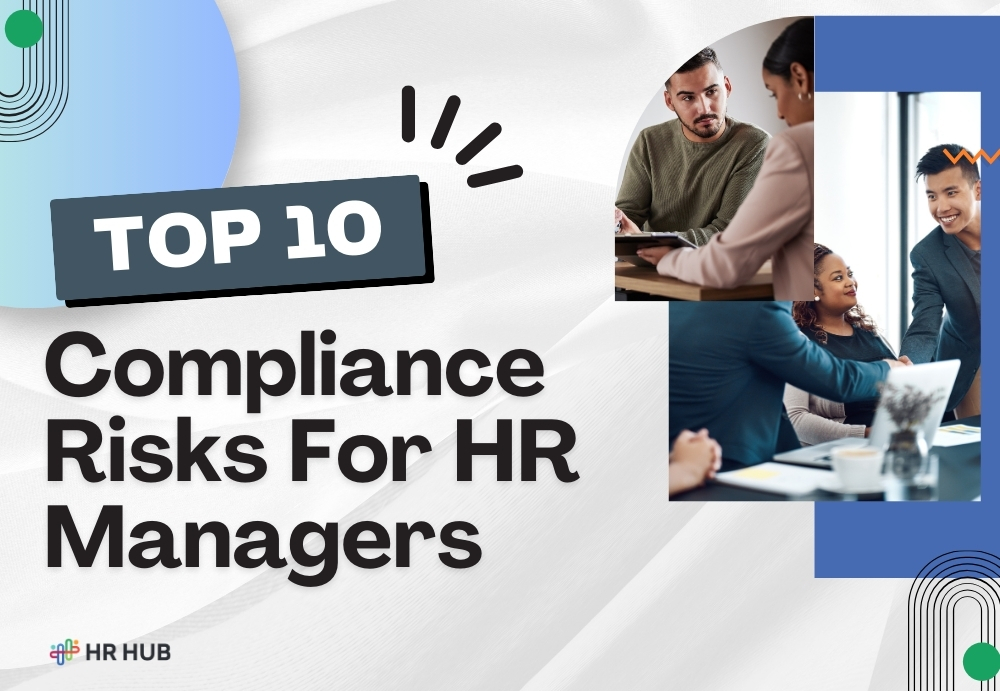Maternity and Paternity Leave in India: Policy, Importance, and Benefits
- Work Culture & Experience


In the dynamic world of human resources, compliance stands as a towering challenge, pivotal to an organization's operational integrity and ethical stature.
Amidst a landscape of legal, ethical, and procedural minefields, HR professionals must steer their organizations clear of potential penalties and foster a culture of transparency and fairness.
Central to their arsenal is the best compliance management software, a tool that transcends its functional utility to become a strategic ally in ensuring adherence to complex regulatory frameworks both globally and within India.

Let’s explore the compliance risks that every HR manager faces on regular work.
In the digital era, the sanctity of personal information is paramount, and this is where the Personal Data Protection Bill steps in, setting a new precedent.
For HR managers, this is not just about legal compliance but about earning the trust of their employees by safeguarding their most sensitive data.
Implementing robust systems to manage and protect employee information securely is critical. It involves employing advanced encryption methods, secure data storage solutions, and regular audits to prevent breaches and ensure that employee data privacy is not compromised. This proactive approach aligns with legal requirements and enhances organizational credibility and security posture.
India's tapestry of employment laws, such as the Maternity Benefit Amendment Act and the Shops and Establishments Act, illustrates the complex legal framework within which HR managers operate.
These laws vary in their content across different states, adding layers of complexity for HR professionals managing multi-state operations.
To navigate this complexity, sophisticated compliance management software becomes indispensable. It aids in monitoring changes to laws in real time and ensuring that policies across various locations are updated, thus maintaining compliance at all levels and avoiding costly legal consequences.
The well-being of employees is a critical concern, underscored by stringent regulations like the Factories Act. These laws mandate specific standards to ensure safe and healthy working environments.
Non-compliance is not just a legal risk but can severely impact employee morale and productivity. Organizations can ensure these standards are met consistently by implementing rigorous health and safety programs and regular audits.
Moreover, engaging employees in safety training sessions and emergency drills can foster a culture of safety and preparedness that goes beyond compliance.
Managing statutory benefits such as Provident Fund (PF), Employee State Insurance (ESI), and gratuity is a substantial operational aspect of HR in India.
Each benefit has its own set of rules and filing deadlines, which can be overwhelming. Detailed record-keeping and timely compliance are crucial to prevent any discrepancies that could lead to penalties or employee dissatisfaction.
Leveraging automated tools within compliance software can streamline these processes, ensuring that filings are accurate and submitted on time, thus maintaining the financial well-being of both the employees and the organization.
For companies in India employing foreign nationals, navigating the complexities of Employment Visas is a significant challenge.
Each visa application must be meticulously managed to meet all prerequisites, from sponsorship documents to compliance with local employment standards. This often requires specialized knowledge and immigration application tools to manage and track the status of multiple applications and renewals, ensuring all foreign employees work legally within the country.
As India progresses towards a more inclusive society, anti-discrimination laws are becoming increasingly significant. HR managers must take a proactive stance in crafting and enforcing policies that prevent discrimination based on any grounds.
This includes conducting sensitivity training, establishing clear reporting mechanisms, and promoting a culture where diversity is valued. These steps aid in legal compliance, enhance employee satisfaction, and contribute to a more harmonious workplace environment.
Correctly classifying employees as permanent, temporary, or contractual is fundamental to ensuring compliance with labor laws.
Misclassification can lead to serious legal and financial implications including penalties and back wages. Accurate classification helps in determining appropriate benefits and rights, which is why HR managers must apply diligent oversight and use classification frameworks supported by compliance management systems.
Efficient record-keeping and meticulous reporting are the backbones of compliance, especially under laws like the Companies Act. These records support compliance and enhance transparency and accountability within the organization.
Implementing automated systems that can help track, manage, and store these records securely ensures that they are readily available for audits, reducing the risk of non-compliance and improving operational efficiency.
With the increasing reliance on technology, complying with the Information Technology Act is essential to protect critical data and maintain privacy. This involves implementing stringent cybersecurity measures such as firewalls, anti-virus software, and regular security audits.
These measures protect against data theft and loss and ensure the integrity and confidentiality of employee and organizational information.
Adhering to ethical standards and corporate governance is crucial, particularly with India's focus on enhancing transparency and accountability in business practices.
Implementing whistleblower protection measures and establishing a vigil mechanism mandated by the Companies Act are steps towards fostering an ethical workplace. These practices not only help in mitigating compliance risks but also build a reputation for integrity and ethical conduct in the business community.
These detailed aspects of compliance highlight the intricate role HR managers play in fostering a legally compliant and ethically robust workplace environment, which is crucial for the sustained success and integrity of an organization in India.
Interestingly, organizations with robust compliance practices witness 60% lower attrition rates than those that do not prioritize compliance.
In conclusion, the ever-evolving landscape of HR compliance presents numerous challenges that demand meticulous attention and strategic action from HR managers.
HR HUB helps organizations maintain compliance by integrating regulatory updates into its system, ensuring that HR processes align with current laws. It automates payroll to include accurate tax deductions and benefits, managing compliance effectively.
Additionally, HR HUB automates essential workflows, minimizing the risk of non-compliance due to human errors. These integrated functions help organizations reduce compliance risks and enhance overall governance.